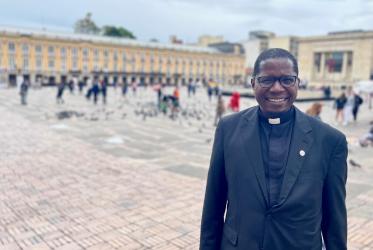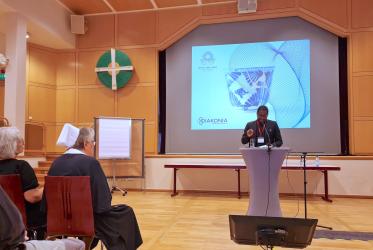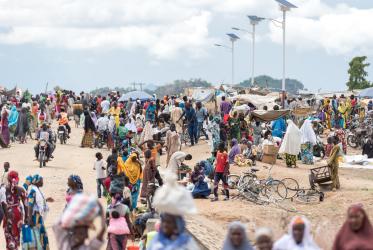Dr Isabel Apawo Phiri
Associate general secretary for Public Witness and Diakonia, World Council of Churches
The leadership of the Soka Gakkai International and UNISDR.
Representatives of Missions
Dear sisters and brothers
The World Council of Churches is pleased to collaborate with the Soka Gakkai International and other actors in today’s roundtable meeting in commemoration of the International Day for Disaster Reduction, which will be observed globally on 13 October. This is a day to celebrate how people and communities around the world are reducing their exposure to disasters and raising awareness about the importance of reducing the risks they face. As we are aware, every hazard has the potential of becoming a disaster. How we cope with the hazard with increased capacities makes all the difference. I understand this year’s edition of International Disaster Reduction marks the launch of the new "Sendai Framework” which replaces the Hyogo Framework of Action.
Disaster Risk Reduction cannot be achieved if we look only at the governments and UN mechanisms. Communities are the most important stakeholders in coping with a disaster, as they are the ones who face the onset. If they are well-prepared, the “natural hazards” will not go on to become “natural disasters”. We would significantly prevent loss of life and property. In this endeavour, the faith communities have a great role to play. I am particularly happy to note the effort to recognise and highlight the faith communities’ contribution in preparing a disaster-resilient community.
I hope this initiative will strengthen the FBO’s role in humanitarian aid. Our general secretary, Rev. Dr Olav Fykse Tveit, attended the World Humanitarian Summit held this year, which underlined the five areas of engagement of humanitarian actors. The five principles are: dignity, safety, resilience, partnerships and finance. We hope the FBOs engaged in humanitarian aid work will continue to uphold these five principles while engaging in responses to natural and human-caused disasters.
This exhibition on “Restoring our Humanity” is based on the five areas of engagement mentioned above and the five responsibilities underlined by UN secretary general Ban Ki-Moon:
1) Global Leadership to prevent and end conflict;
2) Uphold the norms that safeguard humanity;
3) Leave no one behind;
4) Change people’s lives from delivering aid to ending need; and
5) Invest in humanity.
I once again congratulate the lead organisers of this event, particularly the Soka Gakki International and express my gratitude for collaborating with the World Council of Churches in this endeavour.
Let this exhibition awaken your conscience to engage with the humanitarian crises in the world and strengthen your efforts in reducing disasters in the coming years.
Thank you all.



